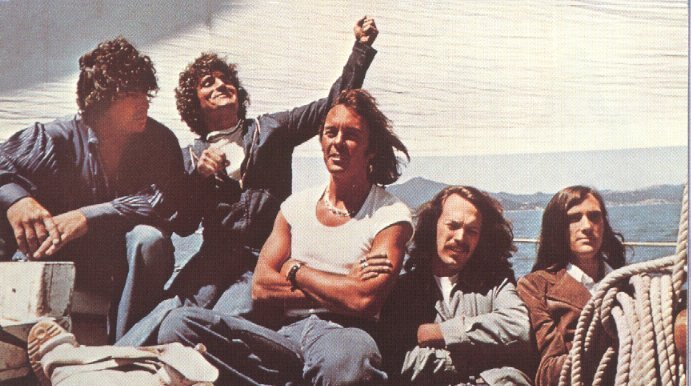
Dino Valenti (1943-1994), David Freiberg, Gary Duncan, Greg Elmore, John Cipollina (1948-1989)

Dino Valenti (1943-1994), David Freiberg, Gary Duncan, Greg Elmore, John Cipollina (1948-1989)
Brian Hogg examines the fascinating history of one of the most important bands to come out of the San Francisco acid-rock movement in the sixties.
There are four San Franciscan groups who best portray the sound and style of the city in the mid-Sixties. While Jefferson Airplane gathered most of the commercial success, the Grateful Dead carried the strongest atmosphere and image. The third group, Big Brother and the Holding Company, have now been swallowed by the myth surrounding Janis Joplin - leaving the fourth, Quicksilver Messenger Service, as the least well remembered, the most mysterious, and perhaps most interesting.
Quicksilver's origins cut across the two major elements of San Francisco's development, the folk clubs and the garage band circuit. The central catalyst was Dino Valenti, an ex-Greewich Village folknik, who had left New York around 1964 and travelled to Los Angeles, hoping for a new career. Although the availability of live work was only patchy, Dino did some recording, and two tracks taped at the World Pacific Studios - "Black Betty" and "Live Is Like That" - eventually appeared six years later on a compilation on Together Records, "Early L.A.". This album also included some of the earliest material by the Byrds, and coincidentally both they and Valenti moved on from these sessions to record one-off singles for Elektra. The Byrds issued "Please Let Me Love You" (as 'the Beefeaters') and Dino "Birdses"/"Don't Let It Down" appeared around the same time.
These weren't the only links between the two acts. Valenti, McGuinn and Crosby of the Byrds knew each other from the folk club circuit, and during the long wait between the recording and release of "Mr Tambourine Man" (some seven months), Jim McGuinn was tempted to leave the Byrds and join Valenti in an alternative venture. The final link was that the Byrds' name was a remodelled adaption of the title of Dino's Elektra single.
After these recordings, Valenti moved upstate to San Francisco and built a local following in the North Beach clubs. Having put down eight unissued tracks for the small Autumn label, he changed his emphasis and began to piece a group together. The earliest recruits were Jim Murray (vocals/harmonica) and guitarist John Cipollina, who'd previously played in the Deacons and the Penetrators, two local R&B dance bands. But before their first rehearsals, Valenti was arrested and imprisoned, the first of several Quicksilver drug busts. Cipollina and Murray were then joined by bassist David Freiberg, a friend of Valenti, another folkie, and half of the David and Michaela duo. By February 1965 the trio had added Casey Sonoban on drums and Skip Spence on second guitar, but this was only a temporary grouping, as Spence was quickly lured away to Jefferson Airplane (as a drummer) in time for their first album. Later of course, he returned to the guitar when he joined Moby Grape. Sonoban also split around this time, leaving the group virtually back where they began.
Meanwhile, well away from the coffee house circuit, a group called the Brogues were establishing themselves as one of San Francisco's finest garage bands. They had formed in 1964 with Bill Whittington, Eddie Rodrigues, Rick Campell and Gregory Elmore, this line-up appearing on their debut single, "But Now I Find"/"Someday". This was issued on the local Twilight label in March 1965, and at the same time they brought in a new guitarist Gary Grubb. He had previously been a member of the Merced Blue Notes and the Ratz, and he joined the Brogues in time to see their first single reissued on the Challenge label with a national distribution, and a new flipside, "Early Bird". Another single, "Don't Shoot Me Down" backed by the quintessential "I Ain't Now Miracle Worker", followed in May, but two months later the Brogues fell apart when two members were drafted.
By a weird coincidence, it was at tis time that Cipollina, Freiberg and Murray had their van break down outside the basement where Grubb and Elmore were living; and so the two fragments were joined together. Gary Grubb changed his name to Duncan and the group took the name Quicksilver Messenger Service (based on their astrological birth signs) and began rehearsing in earnest. When Dino Valenti was released from prison, he was offered the chance to join the new group but refused, suspicious of Elmore and Duncan. This made little difference, however, as two days later he was re-arrested and imprisoned once again.
The first Quicksilver Messenger Service gig was in December 1965, and throughout the following year and more they played solidly in and around the Bay Area, building a reputation as one of the city's leading bands. Initially they tried to interest Autumn Records in the group: the label's M.D., Tom Donahue, was managing Dino Valenti and the Quicksilver thought that their connections there would help. Donahue wasn't interested, however, which was probably just as well as Autumn folded soon afterwards, and instead the group decided to hold out as long as possible, prefering to keep their independence. This early period of their career therefore remains tantalisingly uncharted - officially, at least - although live tapes from this time show just how strong and assured they were. In additon, a bootleg album "Live In San Jose", recorded in Ocober 1966, catches them in frightening form, demonstrating their R&B preoccupations in a set that includes "All Night Worker", "Mona", "Who Do You Love", "Walkin' Blues", "I Hear You Knocking" and "Smokestack Lightning", already crammed with the Cipollina/Duncan guitar interplay which made the group so special.
Even by the middle of 1967, when almost all of their cotemporaries had signed contracts (and Jefferson Airplane had had two Top Ten singles), Quicksilver still refused to fall into line, wary of making the mistake that the Charlatans had with Kama Sutra, Big Brother had with Mainstream and (arguably) the Grateful Dead had with Warner Brothers. They did, however, agree to appear in "Revolution", a classic love/peace/sex/drugs film, and a one-off deal was negotiated with United Artists for the soundtrack album. However, by the time recording began (October 1967) Jim Murray had left, and the two tracks ("Codine" and "Babe I'm Gonna Leave You") which appear on the resulting album are therefore the first by the four-piece group. Both are excellent, among the best things the band ever recorded, and they give a valuable glimpse of some of their material which was a vital part of their live set.
"Revolution" also marked the debut recordings of the Steve Miller Band and Mother Earth, which meant that the album doubled as some kind of sampler of 'the San Francisco Sound' - a fact not lost on British U.A. Two Separate pressings of the LP exist, in different sleeves: the first was simply the soundtrack album, while the later and rarer issue stressed the historical importance of the tracks and carried biographies of each of the groups.
In December 1967, Quicksilver fianlly signed to Capitol, for a hefty advance and a measure of artistic freedom. The same month saw them enter the recording studios with Nick Gravenites and Harvey Brooks as producers. Both were members of the Electric Flag, vocalist and bassist respectively, the two groups being Mill Valley neighbours. Practically a whole album was recorded, mixed and then scrapped, which showed both a quest for perfection and a hesitancy about studio work. Amongst the rejected tracks were "Back Door Man" and "I Hear You Knocking", as well as early versions of songs which did eventually appear on the album: "Dino's Song", "Light Your Windows", "Pride Of Man" and "The Fool". The first three of these were not radically different from those released; but "The Fool", a long improvisatory piece, was strikingly altered, with the earlier version being much longer and more involved. It could well be that Quicksilver felt that the first sessions were to blues-oriented, and that they leaned too much on material which had been in their set almost since their inception. In place of the rejected songs came the rather ordinary "Too Long" and the magnivicent instrumental, "Gold And Silver", which along with the new "Pride Of Man" and "Light Your Widows" was the album's highlight when it was finally issued in June 1968. Capitol previewed it's release a month earlier with Quicksilver's debut single, coupling "Pride Of Man" with "Dino's Song". The single wasn't a success, and neither it nor any of the subseqent U.S. 45s were given a British release.
As these two tracks were the only ones with any semblance of commercial potential, Capitol pushed the band back into the studio, demanding something with more hit possibilities. In September, again with Nick Gravenites as producer, the band recorded two tracks specifically as a single. The topside was "Bears", a piece of pure mayhem. It was a jokey song to begin with, something that was exaggerated by the attempts of the rest of the band to make Freiberg laugh as he recorded the lead vocal. He almost managed to get through the song without breaking up, just allowing one gigle near the end. The flip was something else: "Stand By Me" was another Valenti original (following "Dino's Song") and a stage favourite; a strong, brooding ballad, tinged with a melancholy echo and a piercing guitar line. The single remains the rares Quicksilver artefact, and although "Bears" was included on the 1973 "Anthology" album, "Stand By Me" has never been reissued.
Work was now due on a second album but, usettled at working within the confines of a studio, Quicksilver decided to record a series of gigs from the Fillmores East and West, and splice and edit them together into what still remains a masterpiece, "Happy Trails". Released in March 1969, the album simply reeks of San Francisco, capturing all the excitement, drive and improvisation of a fabulous band. Even the sleeve was perfect, a striking evocation of the group's cowboy preoccupations.
Side 1 was taken up with "Who Do You Love", nearly thirty minutes long, with the Bo Diddley classic ripped apart by Duncan, then Cipollina, and Elmor's rhythmic pounding. The second side opened with a slight touch of deja vu, with "Mona", before seguing into "Maiden Of The Cancer Moon" which in turn flowed into "Calvary", a studio track in which ever-increasing textures of guitar lines were underpinned by rhythmic tracks and voices. The album closed with a brief snatch of the Dale Evans theme tune, "Happy Trails", with a rare Greg Elmore vocal.
It is difficult to over-emphasise the historical (and cultural) importance of this album which along with the Grateful Dead's "Live Dead" epitomised all that was good in San Franciscan rock. It is also the only Quicksilver album which remains in EMI's catalogue, having been reissued in their 'Green Light' series in 1981. One single was taken off the album by the optimistic U.S. record company coupling "Who Do You Love" with another piece of the 'suite', "Which Do You Love". A total flop, copies of this pressing are now very rare.
This period was also responsible for many of the unauthoriesed recordings of the group which have been circulating now for several years. Among the most prized were the tapes of their June 1968 gig at New York's Fillmore East, which featured searing versions of "Back Door Man", "Codine", "Mona/Maiden Of The Cancer Moon", "Gold and Silver" and "Smokestack Lightning", and caught the group at a live peak; and another taken from a Pacific High Recorders radio broadcast from the same year, which included "The Fool", "Dino's Song", "Light Your Windows", "Who Do You Love" and another "Mona/Maiden Of The Cancer Moon". In 1983, Psycho Records in Margate secured the rights to release these tapes on a double album set titled "Maiden Of The Cancer Moon", allowing easier access to these recordings of Quicksilver's classic line-up at their peak. For anyone who enjoys "Happy Trails", this is an essential purchase.
Sadly, "Happy Trails" marked the end of an era, and Greil Marcus's glowing review of the album in 'Rolling Stone' was prefaced by the comment that this "would presumably be Quicksilver's last album". Gary Duncan had in fact left the group before the album was completed, and had to be coaxed into returning to complete his work on "Calvary", before leaving again. The reason was Dino Valenti, again freed from prison, and now living in the Mill Valley area. He occasionally sang with the band, although his time was primarily spent in making his eponymous debut album for Epic, which among his own songs included an excellent shot at "Me And My Uncle" - a legendary John Phillips song which the Mamas and Papas somehow missed out on recording. It soon became clear that Dino and Duncan were becoming close musically, and they decided to form their own band (the Outlaws) and split to New York, looking for more musicians. Apparently, Duncan asked to rejoin Quicksilver just one week later, but only on condition that Valenti joined too. For the moment, that offer was refused.
Now cut to a trio, Quicksilver retired from live work, promting the Marcus comment about their imminent demise. However, they regrouped with the arrival of Nicky Hopkins, who after a long period as a sessionman in Britain (for the Who, the Kinks and the Stones, among others) had now settled in California after spells with the Jeff Beck and Steve Miller bands. This new Quicksilver was radically different in scope: Hopkins became the central figure at the expense of their customary guitar lines, and the resultant album, "Shady Grove", released in December 1969, was something of a disappointment after the innovatory "Happy Trails". Yet there were still some excellent tracks, in particular the title song and "Joseph's Coat", written by Nick Gravenites who also helped with "Flashing Lonesome" and "Holy Moly". A version of the latter song also appears on Nick's own solo album, "My Labours", much of which was recorded live with Mike Bloomfield. However, it also includes three studio tracks, credited to Nick and anonymous 'friends', who appear to have been various members of Quicksilver. There is nothing distinctive about the music to make this certain, but a bit of feedback here and some guitar lines there do support the possibility.
The main weakness on "Shady Grove" was "Edward, The Mad Shirt Grinder", written by Nicky Hopkins and the album's longest track, which lacked the focus and fire of usual extended pieces. Before leaving "Shady Grove" we should also note that the original U.S. pressing has a fold out cover, missing from the U.K. pressing and all subsequent releases.
In January 1970, the seemingly inevitable happened, and the Quicksilver of "Shady Grove" was augmented by the arrival of Duncan and Valenti. If the Hopkins line-up had caused some misgivings, the new band cut Quicksilver's fans by half, with many bemoning the lack of guitar work and complaining that Valenti dominated the album and had turned Quicksilver into his backing band. He certainly wrote all the songs, though under the pseudonym of 'Jessie Oris Farrow' - adopted to avoid his publishing contact with Frank Weber, which had seen him many royalties for "Let's Get Together", a smash for the Youngbloods and the Dave Clark Five. (That song is credited to another 'nom de plume', Chet Powers; while to confuse things further, Valenti's name is often incorrectly credited on "Hey Joe", which he didn't write. That song was composed by one Billy Roberts.)
If Dino was strong on the "Just For Love" album, then the fault - if that's the right word - lay with the group. Throughout their history, Quicksilver had relied heavily on outside material, and the introduction of a strong writer automatically meant that he became dominant. The album did include some good songs, too, particularly the title track, "Fresh Air" and "Cobra", and the problem was really due to preconceptions of what the group were expected to do.
"What About Me" followed six months later in February 1971, and it became clear that Quicksilver were following Valenti's direction. Nicky Hopkins had already left, to be replaced by ex-Paul Butterfield guitarist Mark Naftalin, but the crucial change came just as the album was released, with the departure of John Cipollina, who was clearly unhappy with the new emphasis. His initial project was some work as producer on a Jim Murray solo album, which remained unreleased, before he formed his own group, Copperhead, who remained together until 1973 and released one ultimatly disappointing album. Since then, Cipollina has been part of several shifting aggregations, including Terry and the Pirates, Raven, and the Cipollina/Gravenites Band, amongst others. It would take several pages to chart his work after leaving Quicksilver: suffice to say that he remained true to his 'guitar slinger' image.
"What About Me" was an anti-climax, with only the title track and "Spindrifter" showing much enthusiasm. It naturally fuelled the anti-Valenti vote, but in truth the band had been sliding downhill since "Happy Trails". It was a spiral which continued: "Quicksilver", released in November 1971, was even worse, and saw the loss of yet another original member in David Freiberg who had been arrested for possession of marijuana the previous July and was jailed for two months. When released, he decided not to rejoin the group and instead spent some time with Paul Kanter and Grace Slick before joining Jefferson Airplane/Starship on a full-time basis.
His replacement was Mark Ryan, formerly a member of Country Joe and the Fish. Barely five months elapsed before the group released "Comin' Through", another disappaointing album, with only one really worthwhile track, "Mojo". "Comin' Through" also marked the obligatory personnel change, with Chuck Steaks replacing Mark Naftalin. This was also the line-up which contributed two tracks, "Mojo" and "Fresh Air", to the commemorative "Last Days Of The Fillmore" triple boxed set, recorded live during the week-long closing down 'celebrations'.
The group was now lost for inspiration, and they struggled through a further four permutations between May 1973 and March 1975. Valenti, Elmore and Duncan did remain constant, however, although gigs became less frequent and there were no recordings, despite the fact that Valenti signed a solo contract with Warner Brothers. In what can be seen as a last gasp for survival, Quicksilver line-up No. 12 (Valenti, Duncan, Elmore, bassist Skip Olsen and pianist Michael Lewis) were augmented by John Cipollina and David Freiberg for a last album, "Solid Silver". It was a rather lacklustre and unsuccessful affair, and the resultant tour was pretty much a disaster. By the winter of 1975, Quicksilver Messenger Service had simply disintegrated, with Cipollina taking Skip Olsen to his various loose projects; Freiberg returning to the Starship; Duncan moving to Hawaii; Valenti returning to the life of a solo folk singer around the San Franciscan clubs; and Elmore (and Lewis) simply dropping out of sight. All in all, it was rather a sad and frayed ending to the career of a group which had so much promise; but their demise has at least enhanced their enigmatic and legendary status, confirmed by some of the finest music of the late Sixties.
| Birdses/Don't Let It Down | 1964 Elektra 45012 |
||
| Early L.A. (Various Artists LP with two Valenti tracks) | Together 1014 | ||
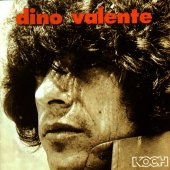 |
Dino (re-released as Dino Valente with two bonus tracks*) Time - Something New - My Friend - Listen To Me - Me And My Uncle - Tomorrow - Children Of The Sun - New Wind Blowing - Everything Is Gonna Be OK - Test - Shame On You Babe* - Now And Now Only* |
1968 Epic BN 26335 1998 Koch KOC-CD-7930 |
|
| But Now I Find/Someday | March 1965 Twilight 408 |
||
| But Now I Find/Early Bird | April 1965 Challenge 59311 |
||
| Don't Shoot Me Down/I Ain't No Miracle Worker | May 1965 Challenge 59316 |
||
| The Brogues (features all above tracks but "Early Bird") | German 12" Line/Taxim LMS 3012 |
||
| Pride Of Man/Dino's Song | Capitol 2194 June 1965 |
||
| Bears/Stand By Me | Capitol 2320 November 1968 |
||
| Who Do You Love/Which Do You Love | Capitol 2557 July 1969 |
||
| Holy Moly/Words Can't Say | Capitol 2670 November 1969 |
||
| Shady Grove/Three Or Four Feet From Home | Capitol 2800 1970 |
||
| Fresh Air/Freeway Flier | Capitol 2920 November 1970 |
||
| What About Me/Good Old Rock'n'Roll | Capitol 3046 March 1971 |
||
| Hope/I Found Love | Capitol 3233 November 1971 |
||
| Doin' Time In The U.S.A./Changes | Capitol 3349 1972 |
||
| Gypsy Lights/Witches Moon | Captiol 4206 1975/U.K. CL 15859 |
||
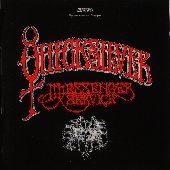 |
Quicksilver Messenger Service Pride Of Man - Light Your Windows - Dino's Song - Gold And Silver - It's Been Too Long - The Fool John Cipollina - Gary Duncan - Greg Elmore - David Freiberg |
Capitol ST 2904 June 1968 |
|
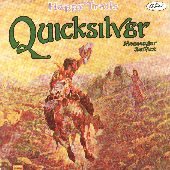 |
Happy Trails Who Do You Love (Part 1) - When You Love - Where You Love - How You Love - Which Do You Love - Who Do You Love (Part 2) - Mona - Maiden Of The Cancer Moon - Calvary - Happy Trails John Cipollina - Gary Duncan - Greg Elmore - David Freiberg |
Capitol EST 120 March 1969 U.K. GO 2012 |
|
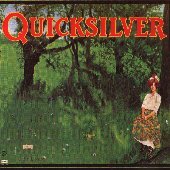 |
Shady Grove Shady Grove - Flute Song - 3 Or 4 Feet From Home - Too Far - Holy Moly - Joseph's Coat - Flashing Lonesome - Word's Can't Say - Edward The Mad Shirt Grinder John Cipollina - Greg Elmore - David Freiberg - Nicky Hopkins |
Capitol EST 391 December 1969 |
|
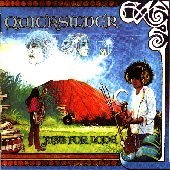 |
Just For Love Wolf Run (Part 1) - Just For Love (Part 1) - Cobra - The Hat - Freeway Flyer - Gone Again - Fresh Air - Just For Love (Part 2) - Wolf Run (Part 2) John Cipollina - Dino Valenti - Gary Duncan - Greg Elmore - David Freiberg - Nicky Hopkins |
Capitol EA-ST 498 August 1970 |
|
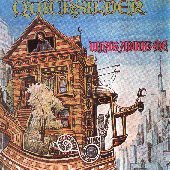 |
What About Me What About Me - Local Color - Baby Baby - Won't Kill Me - Long Haired Lady - Subway - Spindrifter - Good Old Rock And Roll - All My Mind - Call On Me John Cipollina - Dino Valenti - Gary Duncan - Greg Elmore - David Freiberg - Nicky Hopkins - Mark Naftalin -- Jose Rico Reyes - Martine Fierro - Ron Taormina - Frank Morin - Pat O'Hara - Ken Balzell |
Capitol EA-ST 630 February 1971 |
|
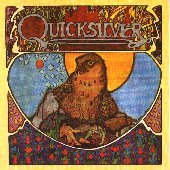 |
Quicksilver Hope - I Found Love - Song For Frisco - Play My Guitar - Rebel - Fire Brothers - Out Of My Mind - Don't Cry My Lady Love - The Truth Dino Valenti - Gary Duncan - Greg Elmore - Mark Ryan - Chuck Steaks |
Capitol SW 819 - November 1971 | |
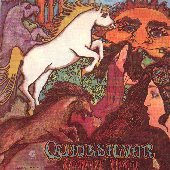 |
Comin' Thru Doin' Time In The U.S.A. - Chicken - Changes - California State Correctional Facility Blues - Forty Days - Mojo - Don't Lose It Dino Valenti - Gary Duncan - Greg Elmore - Mark Ryan - Chuck Steaks -- Ken Baizell - Dalton Smith - Bud Brisbois - Pat O'Hara - Charles C. Loper - Sonny Lewis - Donald Menza |
Capitol ST 11002 April 1972 |
|
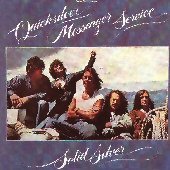 |
Solid Silver Gypsy Lights - Heebie Jeebies - Cowboy On The Run - I Heard You Singing - Worryin' Shoes - The Letter - They Don't Know - Flames - Witches' Moon - Bittersweet Love John Cipollina - Dino Valenti - Gary Duncan - Greg Elmore - David Freiberg -- Nicky Hopkins - Pete Sears - Michael Lewis - Skip Olson - Mario Cipollina - Kathi McDonald |
Capitol ST 11462 October 1975 |
|
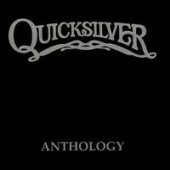 |
Anthology Pride of Man - Dino's Song - The Fool - Bears - Mona - Edward, the Mad Shirt Grinder - Three or Four Feet from Home - Fresh Air - Just for Love - Spindrifter - Local Color - What About Me? - Don't Cry My Lady Love - Hope - Fire Brothers - I Found Love |
Capitol ST 11165 October 1973 U.K. STSP13 |
|
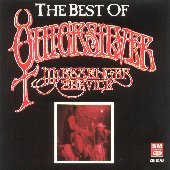 |
The Best Of ... Who Do You Love - What About Me - Shady Grove - Just For Love - Fresh Air - Pride Of Man - Dino's Song - Joseph's Coat - Long Haired Lady - California State Correctional Facility Blues - Stand By Me |
Capitol CDL-57263 1990 Canada |
|
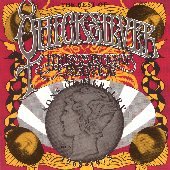 |
Sons Of Mercury (1968-1975) - The Best Of ... (2 CD-Set) - Babe, I'm Gonna Leave You - Codine - I Hear You Knockin' (It's Too Late) - Pride Of Man - Light Your Windows - Dino's Song - The Fool - Gold And Silver - Bears - Who Do You Love - Mona - Maiden Of the Cancer Moon - Calvary - Happy Trails - Shady Grove - Flute Song - Joseph's Coat - Edward, The Mad Shirt Grinder - Fresh Air - Cobra - Subway - What About Me - Local Color - Hope - Fire Brothers - Don't Cry My Lady Love - Doin' Time In The U.S.A. - Gypsy Lights - Cowboy On The Run |
Rhino Records R2 70747 1991 |
|
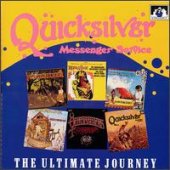 | The Ultimate Journey Who Do You Love - Pride of a Man - Codine - Dino's - Gold and Silver - Joseph's Coat - Shady Grove - Fresh Air - Too Far - Stand by Me - What About Me? - Mona | See For Miles 61 1999 |
|
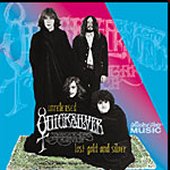 | Lost Gold And Silver Back Door Man - Codine - Gold & Silver - Smokestack Lightning - Light Your Windows - Dino's Song - The Fool - Who Do You Love - Mona/Maiden Of The Cancer Moon/Mona -- I Don't Want To Spoil Your Party (Dino's Song) - Acapulco Gold And Silver (Gold And Silver) - I Hear You Knockin' - Back Door Man - Your Time Will Come - Who Do You Love (Part 1) - Walkin' Blues - Calvary - Codine - Babe I'm Gonna Leave You - Stand By Me - The Bears | Capitol 1999 | |
| Maiden Of The Cancer Moon | Psycho 10 September 1983 U.K. |
||
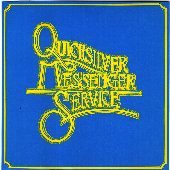 |
QMS - Live In San Jose 1966 All Night Worker - I Hear You Knockin' - Your Time Will Come - Smokestack Lightning - Who Do You Love - Back Door Man - Gold And Silver - Codine - The Fool Jim Murray - John Cipollina - Gary Duncan - David Freiberg - Greg Elmore |
Document Records DR 009 CD 1988 Italy |
Out of print. |
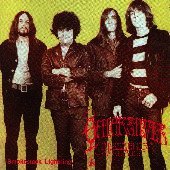 |
Smokestack Lightning Mona - Maiden Of The Cancer Moon - Calvary - Smokestack Lightning - Stand By Me - Calvary - Happy Trails 1-4 recorded live at Fillmore West 1968; 5-7 recorded at Golden State Recorders 19.11.1968 (previously unreleased versions) |
Moby Dick Records MDCD002 1989 Luxemburg |
Out of print. |
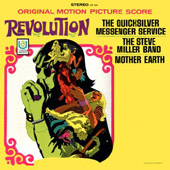 |
Revolution (OST) Codine - Babe I'm Gonna Leave You John Cipollina - Gary Duncan - Greg Elmore - David Freiberg |
U.A. 5185 December 1967 U.K. SULP 1226 and reissue UAS 29069 |
Out of print. |
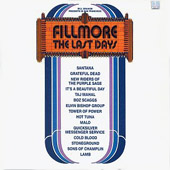 |
Fillmore - The Last Days Mojo - Fresh Air Dino Valenti - Gary Duncan - Greg Elmore - Mark Ryan - Chuck Steaks |
WB Z3x31390 July 1972 U.K. WB K 66013 |
|
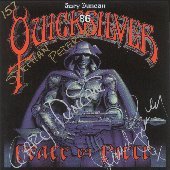 |
Peace By Piece Good Thang - 24 Hour Deja Vu - Midnight Sun - Swamp Girl - Wild In The City - Pool Hall Chili - Crazy Jesse - Pistolero - Electric Love - Peace By Piece Gary Duncan - David Freiberg - W. Michael Lewis - Sammy Piazza - Raul Rekow - John Santos - Jules Broussard - Steve Schuster - Martine Fierro - Linda Imperial - Jo Baker - Kathi McDonald |
Capitol 12498 1986 Pymander Records P-008 1997 (re-release) |
Get it here. |
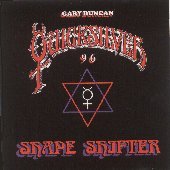 |
Shape Shifter Rebel - Big Bright Street - The Dog Song - Bubba Jeans - Life Is So Funky - Angeline - Carnival Time In Nicaragua - I Don't Wanta Hear It Anymore - Don't Go To Strangers - Richmond Welfare Strut - Nobody But You We'll Be Together - Tattoo - Rex Dark - King-O-China - Snoman/Nica's Dream - The Fatman - Steve McQueen - Close Enough For Jazz - Please Don't Touch The Tip - Gangster Purple - Vera Cruz - What Did You Do To You Do? - Jackie Boy - Blue Weasel On Ice - Hoochie Coochie Man - Sugar Pie - Holiday |
Pymander Records P-007 1996 (2CD-Set) Captain Trip Records CTCD-075/76 Japan |
Get it here. |
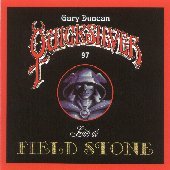 |
Live At Field Stone Voodoo Boogie #1 - Senor Blues - Gator Bait - Bubba Jeans - Close Enough For Jazz - Maiden Voyage - Fieldstone Shuffle Gary Duncan - Michael Lewis - Greg Errico - Boby Vega - John Bird - Tony Menjivar |
Captain Trip Records CTCD-071 1997 Japan |
Get it here. |
| © 2002-2015 bay-area-bands.com |